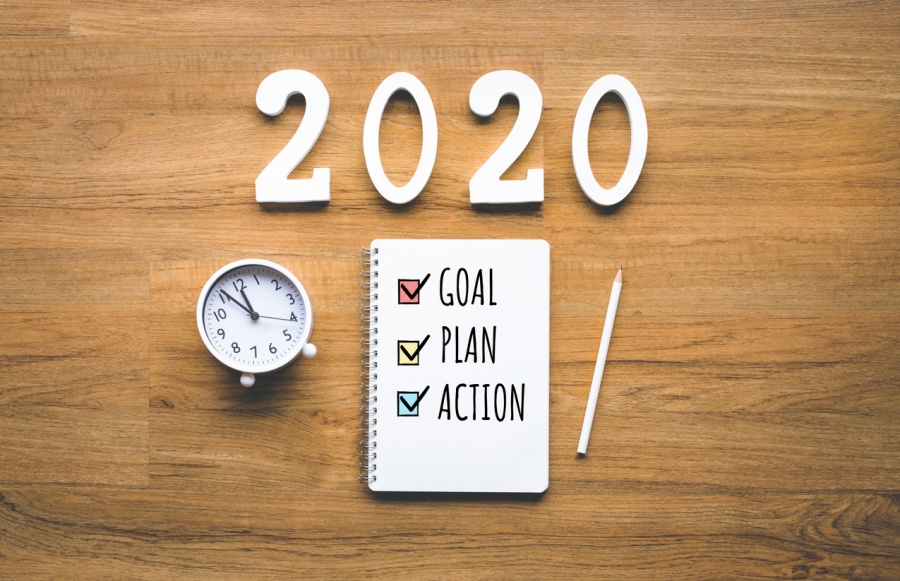The Psychology of Goal Setting
by Cameron – Wednesday, 26 February 2020
If you take a peek at the Velocity Team page you’ll see that every employee has their own quote that they think defines something they believe. Mine is, “The best way to get started is to quit talking and begin doing.” As much as I love that quote, I feel that it falls short. If your goal is to become a world class sprinter, just running more isn’t going to get you there! You need a start point and an end point, and you need the directions to get between them. Goal setting can be relentlessly frustrating. It takes a lot of time and energy to map out your path, which is something not all of us are inclined to do. At the same time it is crucial to help you manage each day with success and to monitor your progress along the way. It provides the tools for self-motivation and self-reflection that are necessary. Setting goals is linked with higher motivation, self-esteem, confidence, and autonomy (Locke and Lathan, 2006). Research has also established a strong connection between goal-setting and success (Matthews, 2015).

What is Goal Setting?
In psychology, goal setting refers to a successful plan of action that we set for ourselves. It provides the roadmap to achieving a desired objective. The sky is the limit, as it’s been proven that setting ambitious goals is linked to better performance and productivity than those who have not. There are three features to goal setting which you can use as a template for your own plan.
As Easy as ABC
Effective goals should follow the ABC plan:
Achievable, Believable, Committed
Goal setting needs to be adjusted as you progress. You can’t become an expert at anything right away, so start with the basics. Set goals that can be attained with hard work and focus. It has to be something you know is possible with commitment and energy. From there it’s only how far you’re willing to go. George T. Doran, explained there are 5 key rules for goal setting effectively which have been adopted by managers and individuals across the world.
Make Your Goals SMART
S-M-A-R-T goals stand for:
S (Specific) – They target a particular area of interest and focus on building it.
M (Measurable) – The results can be gauged quantitatively or at least indicated by some qualitative attributes. This helps in monitoring the progress after executing the plans. For instance if you want to achieve a specific body fat percentage, you are able to calculate your macronutrients, calories, and measure percentage decreases throughout the planned time.
A (Attainable/Achievable) – The goals are targeted and individualised. They take into account the fact that goals are not a “one size fits all”, and are flexible to your own plans.
R (Realistic) – They are practical and planned in a way that would be easy to implement in real life. The purpose of a smart goal is not just providing the plan, but also making it possible to succeed.
T (Time-bound) – An element of time makes the goal more focused. It also provides a time frame about when you expect results!
Be smartER
The golden rules have grown to include:
E (Evaluative/ethical) – The goals are in line with your own moral compass, and you can evaluate the progress along the way.
R (Rewarding) – The end-results of the goal-setting comes with a positive reward and brings a feeling of accomplishment to you. You want to feel some sense of achievement and excitement to reaching the finish line, otherwise why do it!

The Psychology Of Goal Setting
Goals help us build self confidence and perceive obstacles differently. We are more likely to have a positive outlook of the future, and to not interpret setbacks as failures, but as shortcomings. Think of them as tools for training your brain just like your body! We are training our brain to rewire itself into thinking about what we want in life and to crave fulfilment. Goals help bind us to reality. We become aware of our strengths and weaknesses and choose actions that are in line with our potential. For example, if you have strong balance, you can seek to improve your strength and engage in activities like dancing, yoga, or pilates.
Realising our abilities and accepting them is a vital aspect of goal-setting as it makes room for introspection and helps in setting realistic expectations from ourselves. That does not mean you have to limit yourselves to skills and activities you are not already inclined to, instead, it simply means you that higher motivation comes from the belief you can achieve the goal.
Goal-setting as a personal habit is also beneficial to hold ourselves in perspective. Personal goal-setting may be as simple as maintaining a daily to-do list or planning our career moves beforehand. As we have a clear vision of the end-goals, it becomes easier for us to advance towards them.
So the question now is, how do we set successful goals?
4 Steps To Successful Goal-Setting
- Make A Plan: Align goals with your strengths and aspirations. Creating a brilliant plan helps us focus on whats most important and where to implement the action.
- Explore Resources: Find mentors, trainers, and look for all the information you need to get started on your journey. Take self-assessments to evaluate yourself, and identify your strengths and weaknesses.
- Be Accountable: Find a way to quantify your efforts. Set a range for what you want to do. We tend to perform better when someone is watching over us, for example, it is easier to cheat on a diet or skip the gym when we are doing it alone.
- Use Rewards and Feedback: Give yourself remuneration for your efforts. It could be a cheat meal day, or taking a vacation day to relay. Rewarding ourselves for effort and achievements make plans easier to stick with. Try to find a trusted person to confide in and get feedback about your progress. It helps with both the accountability and provides an outlet to communicate.

There are also three main types of goals described in psychology that are described. Find the one that fits best with what you want to accomplish. It will help you organise how you want to achieve your aspirations:
- The Process Goals
These are the ones involving the execution of plans. For example, going to the gym in the morning or taking the health supplements on time, and repeating the same action every day is a process goal. The focus is to form the habit that will ultimately lead to achievement. - The Performance Goals
These goals help in tracking progress and give us a reason for continuing the hard work. For example, studying for no less than 6 hours a day or working out for at least 30 minutes per day can help us in quantifying our efforts and measuring the progress. - The Outcome Goals
Outcome goals are the successful implementations of process and performance goals. They keep us in perspective and help to stay focused on the bigger picture. Examples of outcome goals may include winning a sport, losing the desired amount of weight, or scoring a top rank in school.
Goal setting helps enlighten, encourage, and enable us. We find insights into our strengths and weaknesses and helps gain the knowledge for what we want to achieve. It provides motivation, and as we progress our confidence grows. It’s a way we can quantify our efforts, and most importantly build our skills. There is nothing quite like the satisfaction of finishing something we’ve started, being able to look at the journey and see our desired results. With any of your fitness and health goals, you can always approach our instructors and staff and we’ll be happy to help you make a plan. Don’t think about starting tomorrow, start today.
References
Locke, E. A., & Latham, G. P. (2006). New Directions in Goal-Setting Theory. Current Directions in Psychological Science, 15(5), 265-268.
Matthews, G. (2015). Goal Research Summary. Paper presented at the 9th Annual International Conference of the Psychology Research Unit of Athens Institute for Education and Research (ATINER), Athens, Greece.
Doran, G. T. (1981). “There’s a S.M.A.R.T. way to write management’s goals and objectives”. Management Review. 70(11): 35–36.



Protein and Strength: How to Maximize Your Gains
/in Health, Lifestyle, Living in Zug, Living in Zurich, Power/by CaseyGet to Know Your New Velobeat Coach
/in Health, Lifestyle, Living in Zug, Living in Zurich, Power/by CaseyVeloloco Partners 2025
/in Lifestyle/by Casey